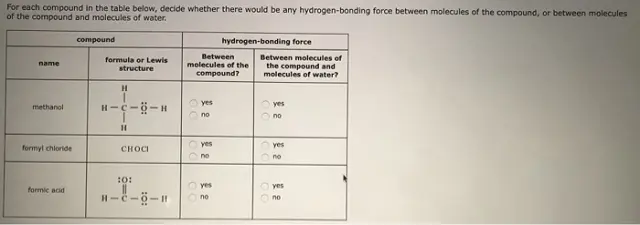Question
For each compound in the table below, decide whether there would be any hydrogen-bonding force between molecules of the compounds, or between molecules of the compound and molecules of water compound hydrogen-bonding force Between molecules of la or Lewis molecules of the the and molecules of water? yes yes methanol yes no formyl chloride CHOCI no yes yes no formic acid
Answer
Polar molecules containing hydrogen atoms bonded directly to small electronegative atoms (like F, O, or N) exhibit an intermolecular force called hydrogen bonding.
Only N, O, F can act as hydrogen bond acceptors.
If hydrogen is attached to any of the 3 elements above, this hydrogen can be donated.
(1) Methanol forms intermolecular H-bonding with themselves as well as with water molecules.
a. Between molecules of the compound ( YES)
b. Between molecules of the and molecules of the water (YES)
(2) Formyl chloride is an acid, due to its hydrogen bonding with water molecules its acidity can be attributed.
a. Between molecules of the compound (NO)
b. Between molecules of the compound and molecules of the water. (YES)
(3)
Formic acid also participates in intermolecular H-bonding with themselves as well as with water molecules.
a. Between molecules of the compound ( YES)
b. Between molecules of the compound and molecules of the water (YES)
Table of Contents
The Impact of Chemical Compounds in Everyday Life: A Comprehensive Guide
Introduction
Chemical compounds, often referred to as compounds, are the backbone of our daily routines, playing a vital role in numerous products and processes that we rely on. From the water we drink to the medicines we take, these compounds are essential for our existence. In this informative article, “Everyday Life: What You Need to Know,” we will delve into the intriguing world of chemical compounds, shedding light on their presence, importance, and influence on our day-to-day activities. Whether you are interested in the science behind household items or the chemistry of nutrition, understanding these compounds will offer valuable insights into the world around you.
Exploring Chemical Compounds
At its core, a chemical compound is a substance formed by the bonding of two or more elements. These elements come together in specific ratios to create compounds that possess unique properties. For example, water (H₂O) is a compound made up of hydrogen and oxygen in a 2:1 ratio. The characteristics of a compound differ significantly from those of the individual elements it comprises. Having a grasp of these basic concepts is essential to recognize the role in our daily lives.
Examples of Chemical Compounds in Everyday Life
Chemical compounds are a vital part of our daily lives, impacting us in ways we may not fully appreciate. Here are some instances of chemical compounds that hold significant importance in our everyday experiences:
- Water (H₂O)
Water stands as a fundamental compound crucial for all living beings. It is utilized for drinking, cooking, cleaning, and a multitude of other tasks. Water’s distinctive properties as a solvent make it indispensable in biological functions and industrial processes. - Sodium Chloride (NaCl)
Commonly known as table salt, sodium chloride is employed to season and preserve food. It also plays a crucial role in maintaining the electrolyte balance in our bodies, which is vital for proper nerve and muscle function. - Carbon Dioxide (CO₂)
Carbon dioxide is a naturally occurring compound that humans exhale and plants utilize in photosynthesis to produce oxygen. Additionally, it is utilized in the carbonation of beverages like soda and sparkling water. - Acetic Acid (CH₃COOH)
Present in vinegar, acetic acid is utilized in cooking and as a natural cleaning agent. It possesses antimicrobial properties that are beneficial for food preservation and household cleaning. - Glucose (C₆H₁₂O₆)
Glucose is a simple sugar that serves as a primary energy source for cells within our body. It is present in numerous foods, especially fruits and sweets, and is essential for metabolism and energy production. - Sodium Bicarbonate (NaHCO₃)
Known as baking soda, sodium bicarbonate is employed in baking to aid dough in rising. It also acts as an antacid for relieving heartburn and as a gentle cleaning agent. - Ethanol (C₂H₅OH)
Ethanol is the form of alcohol found in alcoholic beverages. It is also utilized as a solvent, in hand sanitizers, and as a fuel or fuel additive in automotive settings. - Aspirin (C₉H₈O₄)
Aspirin is a widely utilized medication for easing pain, reducing inflammation, and lowering fever. Additionally, it is used in small doses to decrease the risk of heart attacks and strokes. - Calcium Carbonate (CaCO₃)
Calcium carbonate can be found in antacids like Tums, which are used to relieve indigestion and heartburn. It also serves as a crucial component of limestone and marble in construction and is included in toothpaste as a mild abrasive. - Polyethylene (C₂H₄)n
Polyethylene is a common type of plastic utilized in various products such as grocery bags, bottles, and containers. Its adaptability and durability make it a key player in the packaging industry.
Health and Medicine
Chemical compounds are essential in the realm of health and medicine, with medications often comprising specific compounds that interact with our bodies to treat illnesses and symptoms. For instance, acetaminophen (paracetamol) is a compound utilized for pain relief and fever reduction. Understanding the chemical makeup and functions of these compounds aids in the development of effective treatments and enhances patient care.
The Role in Household Products
Many household products owe their efficacy to the chemical compounds they contain. Cleaning agents, for instance, incorporate compounds like sodium hypochlorite (bleach) or ammonia, which aid in disinfecting surfaces and removing stains. Personal care products such as shampoos and soaps include compounds like sodium lauryl sulfate, serving as surfactants to cleanse and eliminate oils from the skin and hair.
The Future
Advancements in chemistry are paving the way for the discovery and development of new with innovative applications. From biodegradable plastics to cutting-edge pharmaceuticals, the future holds promising prospects for the role of chemical compounds in enhancing our quality of life and addressing global challenges like sustainability and healthcare.
In Conclusion
Chemical compounds play a pivotal role in our everyday lives, influencing everything from fundamental bodily functions to advanced technological innovations. By comprehending the nature and significance of these compounds, we can better grasp the world around us and make informed choices regarding the products we use. Whether in the realms of health, household products, or environmental sustainability, the study of chemical opens up avenues to a deeper understanding of the interconnectedness of science and daily life.




